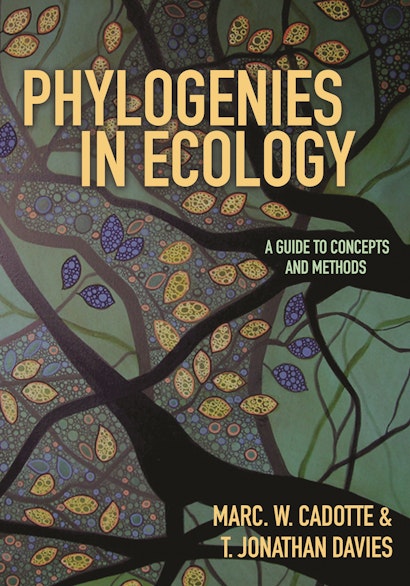Phylogenies in Ecology is the first book to critically review the application of phylogenetic methods in ecology, and it serves as a primer to working ecologists and students of ecology wishing to understand these methods. This book demonstrates how phylogenetic information is transforming ecology by offering fresh ways to estimate the similarities and differences among species, and by providing deeper, evolutionary-based insights on species distributions, coexistence, and niche partitioning. Marc Cadotte and Jonathan Davies examine this emerging area’s explosive growth, allowing for this new body of hypotheses testing.
Cadotte and Davies systematically look at all the main areas of current ecophylogenetic methodology, testing, and inference. Each chapter of their book covers a unique topic, emphasizes key assumptions, and introduces the appropriate statistical methods and null models required for testing phylogenetically informed hypotheses. The applications presented throughout are supported and connected by examples relying on real-world data that have been analyzed using the open-source programming language, R.
Showing how phylogenetic methods are shedding light on fundamental ecological questions related to species coexistence, conservation, and global change, Phylogenies in Ecology will interest anyone who thinks that evolution might be important in their data.
Marc W. Cadotte is associate professor of biology at the University of Toronto, Scarborough. T. Jonathan Davies is assistant professor of biology at McGill University.
"Ecophylogenetics overlays knowledge of the origin of species with contemporary patterns found in the study of biological communities. To enhance understanding of this new synthesis, the authors provide not only data, but also the programming code (in the R language) so readers can test their comprehension. . . . With 101 figures, 285 snippets of R language programming code, and a 43-entry glossary, this book is as much a how to guide as it is an introduction to this new approach."—Choice
"A history lesson, textbook, and lab manual all in one, this terrific book explores the concepts and methods at the intersection of ecology and phylogenetics, from community ecology to conservation. Perfect for experienced researchers and students new to the field."—David Ackerly, University of California, Berkeley
"This how-to manual is a comprehensive review and an important, encouraging, and evenhanded critique of ecophylogenetics. Cadotte and Davies give examples of the full range of ecophylogenetic analyses, which a reader can easily execute, learn from, and then use to create new ways for incorporating phylogenetic information to better understand the workings of organismal assemblages. A super book."—Campbell Webb, Harvard University
"With scope and rigor, this book makes a compelling case that there are indeed ways to gain insights into important ecological questions using phylogenetic methods. A significant contribution to the field, the book presents new conceptions of how community assembly and evolutionary history interact, as well as new interpretations of data. This work provides a clear blueprint for moving the field ahead and will greatly catalyze future work."—Mathew Leibold, University of Texas, Austin

